“Objectively assessing Sitaram Yechury's contributions is challenging, but his commitment to Marxism-Leninism and defence of secularism will inspire future generations of Communists and progressives,” wrote Karat.
Published Sep 21, 2024 | 5:32 PM ⚊ Updated Sep 21, 2024 | 5:32 PM

Sitaram Yechury, who was then the President of the JNU Students' Union, led a student march to the residence of Prime Minister Indira Gandhi. Picture credits : Twitter/ @Advaidism
Sitaram Yechury, 72, General Secretary of CPI(M), died on 12 September, 2024, after a brief illness. Tributes have been pouring in from world over, reflecting his influential statesmanship beyond his party’s scope.
Prakash Karat, in a tribute written for the newsletter on CPIM’s website, reflected on the profound difficulty and pain of writing about Comrade Sitaram Yechury in the past tense, given their shared political journey spanning five decades.
Their comradeship had began in 1974 at Jawaharlal Nehru University, and progressed through the Students’ Federation of India and later within the CPI(M). Both were inducted into the Party Centre, sharing similar trajectories that saw them rise through the ranks to the Central Committee, Central Secretariat, and the Polit Bureau.
Karat emphasised Yechury’s multifaceted contributions to the CPI(M), the Left, and the broader democratic movement. He noted Yechury’s exceptional ability to connect with leaders of secular opposition parties, yet highlighted his significant role in shaping the Party’s ideological positions grounded in Marxism-Leninism.
From its inception, the CPI(M) had maintained a strong commitment to Marxist principles, navigating ideological challenges both domestically and internationally. Yechury continued this tradition, notably critiquing Mikhail Gorbachev’s 1987 speech, which introduced ideas at odds with Marxist analysis.
The CPI(M) was the first to address these deviations, with Yechury playing a crucial role in drafting resolutions that warned of potential crises within the Soviet Union and Eastern Europe.
After the Soviet Union’s collapse in 1991, Yechury guided the Party in reassessing its ideological positions, notably at the 14th Congress in 1992. He was instrumental in crafting an ideological document that established him as a key Marxist theoretician within the Party.
In 1993, Yechury organised an international seminar on the relevance of Marxism, underscoring his leadership in ideological discourse. His critiques of Hindutva ideology, particularly his analysis of M.S. Golwalkar’s work, further demonstrated his commitment to defending secularism and democracy against rising communal forces.
Karat noted Yechury’s essential role in updating the CPI(M)’s Programme, adapting it to the changing political landscape shaped by neoliberalism and the rise of the BJP. His strategic insights had helped the Party navigate contemporary challenges to secular democratic principles.
Yechury’s last major initiatives had included preparing for the Party’s 24th Congress and formulating strategies following the 2024 Lok Sabha elections. Even while in hospital, he remained concerned about the Party’s preparations, demonstrating his unwavering dedication.
Karat concluded by acknowledging the challenges of assessing Yechury’s contributions objectively but affirmed that his commitment to Marxism-Leninism and advocacy for a just, socialist society would continue to inspire future generations of Communists and progressives.
(Edited by Ananya Rao)
